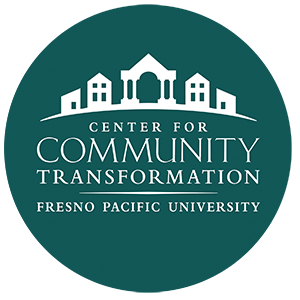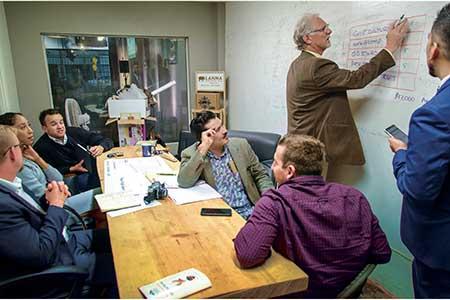Jeff Merritt (BS ’11) drove his blue Chevy pickup past the vineyards in the rich San Joaquin Valley soil, bound for another farm to help its owner maximize groundwater and satisfy new state regulations. With roots in farming and a degree in chemistry, Merritt started a company in 2016 that produces fertilizer that unlocks soil nutrients with less irrigation.
“I’ve always had an entrepreneurial spirit,” says Merritt, who at eight years old operated a tractor on his family’s ranch and at 16 took charge of his own acreage. “My goal is to help farmers save money and produce more per acre.” His enterprise showcases a commitment by FPU to strengthen the region’s economy that plays out on several fronts:
- Graduates start businesses that provide opportunities for growth, innovation and prosperity.
- The university’s Center for Community Transformation (CCT) helps entrepreneurs launch small companies that are the engines of job creation.
- Faculty members partner with local businesses for employee training and advancement to increase family and community stability. “Fresno Pacific faculty equip graduates with the skills and mindset necessary to be change-makers who foster hope and help build a better future for the Valley,” says Katie Fleener, Ph.D., dean of the School of Business.
PROMOTING ECONOMIC BALANCE
Small businesses are vital to broaden the Valley’s economic base. “Agriculture is our foundational industry, but it goes through cycles, and we have to balance that out with a vibrant entrepreneurial economy,” says Rich Mostert (BA ’01). An adjunct faculty member, Mostert directs the Valley Community Small Business Development Center, a partner of the federal Small Business Administration. “We took a hit during the pandemic, but we’re beginning to see a resurgence of small business development,” he says.
One new business owner is Maria Eliza Mejia-Ng (MA ’17, BA ’15), who started Radiant Valley Interpreting in Dinuba in 2020, providing interpreting services in English and Spanish in medical, legal and religious settings. The need in the Valley’s large Hispanic population is high, Mejia-Ng says. “We have a lot of first-generation parents and grandparents who work and don’t have time to study English in school. It’s a blessing to be a bridge that connects cultures.” Mejia- Ng displayed an entrepreneurial spirit at FPU, starting College Minions, which she still operates, employing 15 college and high school students as servers at catered events. “It’s a great way to empower and teach young people the responsibility of adulthood,” she says.
CENTER FOR COMMUNITY TRANSFORMATION

Meanwhile, Launch Central Valley—a CCT initiative begun in 2020—will assist more than 300 Valley entrepreneurs to get businesses thriving over the next five years, financed by nearly $1 million from the Lilly Endowment. “The unemployment crisis has generated the need for people to develop alternative sources of revenue for their families,” says Randy White, D.Min., executive director of CCT, and associate professor at FPU. “Launch Central Valley provides a micro-enterprise solution for people in need, and the mentoring to pull it off,” he says. Participants in the first cohort launched eight new micro-businesses, and the next cohort quickly filled up with others eager to do the same.
Tabitha Sullivan, who started Tab’s Bookkeeping in 2020 in Fresno, was in the first cohort. She found it most helpful to learn about marketing, which is vital to success but something she knew little about. “The networking in the cohort was big for me, too,” Sullivan says. “You could say, ‘I’m struggling with an issue right now,’ and you knew the others were dealing with it, too, had dealt with it or would deal with it in the future. It definitely built my confidence.”
CCT boosts the Valley’s economy by:
- Helping more than 50 social enterprises address social problems with business principles.
- Training more than 100 Faith & Finances facilitators to help families stabilize finances.
- Training Work Life curriculum facilitators to teach employment skills.
 FPU REACHES OUT
FPU REACHES OUT
Fresno Pacific is committed to establishing partnerships with community industries that maximize the benefit for businesses. “Whether it’s long-range or tax planning, workforce education or attracting the right talent, we’re here to help,” says Steven Redekop, director of foundation development and legacy gifts. In addition, a team of advancement and marketing/ communications staff is working with the School of Business to produce short videos on tips and advice for companies and business professionals. This “Business Insights”program also includes roundtables and workshops (see pg. 19).
Meanwhile, two assistant business professors— Sharon Starcher, D.B.A. (MA ’07, BA ’99), and Michelle Bradford, Psy.D.—provided employee training earlier this year at LiDestri Foods’ manufacturing plant in Fresno. Select employees interested in supervisor jobs participated in eight virtual sessions. Role-playing exercises by Starcher and Bradford portrayed a realistic preview of what managers deal with from employees and peers, says Ron Benedicto, LiDestri’s human resources manager. The virtual sessions allowed employees to experience online education and see its benefits. The underlying message: “Go to school. Get an education. It’s cool,” Benedicto says. “Maybe it will inspire our folks to take the next step and get their college degrees.”
“Hearing about people from the training getting promotions and other opportunities is rewarding. We’re thankful to work with a company that places a high value on promoting from within,” Starcher says. Bradford adds: “It is a blessing to know that the information we shared was immediately applicable to the workplace environment and supported LiDestri’s vision of employee advancement.”
‘TRUE VALUE’
Merritt, who produces the new fertilizer, graduated from FPU intending to attend pharmacy school. But his entrepreneurial spirit led him instead to become his ownboss. “When you own the company, you get paid your true value,” he says. His firm, Axiom Ag in Reedley, CA, has three employees and works with three independent contractors, creating jobs while meeting a local need. “In developing my product, I took what I understood about chemistry and biology to fill a hole in the farm economy,” Merritt says.
At 16, Merritt learned about that economy in a hands- on way. His grandfather gave him total responsibility for 20 acres of stone fruit: fertilizing, spraying, hiring crews and more. The grandfather promised to split the profit at harvest, and a wiser young man collected his share at the end of the season. “I never worked so hard in my life for $3,000,” Merritt says.
A future Fresno Pacific entrepreneur had taken a big step.

